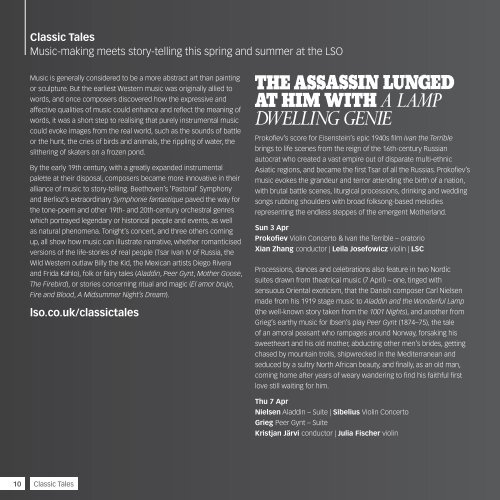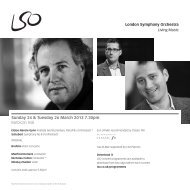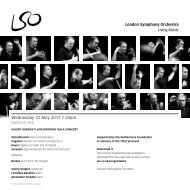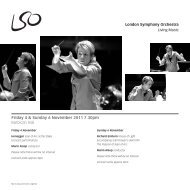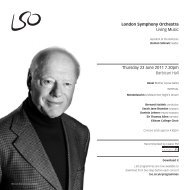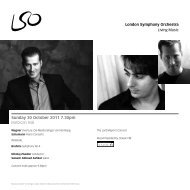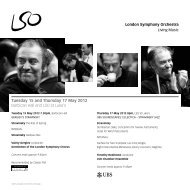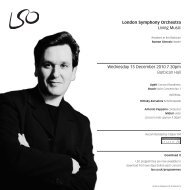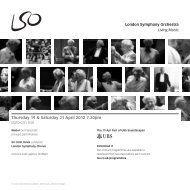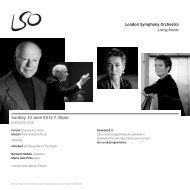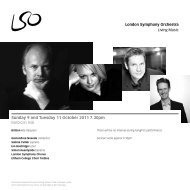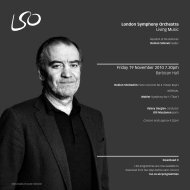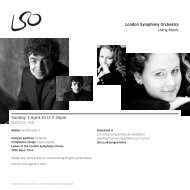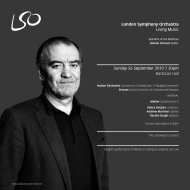Sunday 17 April programme - London Symphony Orchestra
Sunday 17 April programme - London Symphony Orchestra
Sunday 17 April programme - London Symphony Orchestra
Create successful ePaper yourself
Turn your PDF publications into a flip-book with our unique Google optimized e-Paper software.
Classic Tales<br />
Music-making meets story-telling this spring and summer at the LSO<br />
Music is generally considered to be a more abstract art than painting<br />
or sculpture. But the earliest Western music was originally allied to<br />
words, and once composers discovered how the expressive and<br />
affective qualities of music could enhance and reflect the meaning of<br />
words, it was a short step to realising that purely instrumental music<br />
could evoke images from the real world, such as the sounds of battle<br />
or the hunt, the cries of birds and animals, the rippling of water, the<br />
slithering of skaters on a frozen pond.<br />
By the early 19th century, with a greatly expanded instrumental<br />
palette at their disposal, composers became more innovative in their<br />
alliance of music to story-telling. Beethoven’s ‘Pastoral’ <strong>Symphony</strong><br />
and Berlioz’s extraordinary Symphonie fantastique paved the way for<br />
the tone-poem and other 19th- and 20th-century orchestral genres<br />
which portrayed legendary or historical people and events, as well<br />
as natural phenomena. Tonight’s concert, and three others coming<br />
up, all show how music can illustrate narrative, whether romanticised<br />
versions of the life-stories of real people (Tsar Ivan IV of Russia, the<br />
Wild Western outlaw Billy the Kid, the Mexican artists Diego Rivera<br />
and Frida Kahlo), folk or fairy tales (Aladdin, Peer Gynt, Mother Goose,<br />
The Firebird), or stories concerning ritual and magic (El amor brujo,<br />
Fire and Blood, A Midsummer Night’s Dream).<br />
lso.co.uk/classictales<br />
10 Classic Tales<br />
Prokofiev’s score for Eisenstein’s epic 1940s film Ivan the Terrible<br />
brings to life scenes from the reign of the 16th-century Russian<br />
autocrat who created a vast empire out of disparate multi-ethnic<br />
Asiatic regions, and became the first Tsar of all the Russias. Prokofiev’s<br />
music evokes the grandeur and terror attending the birth of a nation,<br />
with brutal battle scenes, liturgical processions, drinking and wedding<br />
songs rubbing shoulders with broad folksong-based melodies<br />
representing the endless steppes of the emergent Motherland.<br />
Sun 3 Apr<br />
Prokofiev Violin Concerto & Ivan the Terrible – oratorio<br />
Xian Zhang conductor | Leila Josefowicz violin | LSC<br />
Processions, dances and celebrations also feature in two Nordic<br />
suites drawn from theatrical music (7 <strong>April</strong>) – one, tinged with<br />
sensuous Oriental exoticism, that the Danish composer Carl Nielsen<br />
made from his 1919 stage music to Aladdin and the Wonderful Lamp<br />
(the well-known story taken from the 1001 Nights), and another from<br />
Grieg’s earthy music for Ibsen’s play Peer Gynt (1874–75), the tale<br />
of an amoral peasant who rampages around Norway, forsaking his<br />
sweetheart and his old mother, abducting other men’s brides, getting<br />
chased by mountain trolls, shipwrecked in the Mediterranean and<br />
seduced by a sultry North African beauty, and finally, as an old man,<br />
coming home after years of weary wandering to find his faithful first<br />
love still waiting for him.<br />
Thu 7 Apr<br />
Nielsen Aladdin – Suite | Sibelius Violin Concerto<br />
Grieg Peer Gynt – Suite<br />
Kristjan Järvi conductor | Julia Fischer violin


